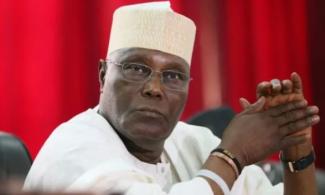
Atiku claimed that the award was cloaked in mystery because the Minister of Works, Engineer Dave Umahi, declined to reveal the contractual amount involved in the project.
Former Vice President and Peoples Democratic Party presidential candidate for the 2023 general election, Atiku Abubakar, has chastised President Bola Tinubu's administration for awarding the 700-kilometre Lagos-Calabar Coastal Highway project to Hitech Construction Company Limited “without any evidence of competitive bidding or a decision by the Federal Executive Council (FEC)”.
Atiku claimed that the award was cloaked in mystery because the Minister of Works, Engineer Dave Umahi, declined to reveal the contractual amount involved in the project.
In a statement signed on his behalf by his spokesman, Mr Paul Ibe, entitled "Tinubu and Chagoury's Dubious Lagos-Calabar Highway Project," Atiku stated that "Tinubu administration has again inadvertently revealed its penchant for dubious and shady deals in the face of this 700-kilometer Lagos-Calabar coastal highway."
The PDP chieftain said, “In September 2023, barely weeks after being appointed by Tinubu, Works Minister, Engr. Dave Umahi announced that the project had been awarded to Gilbert Chagoury’s Hitech Construction Company Limited (Hitech) without any record of competitive bidding or a decision by FEC.
“Umahi refused to reveal how much the project would cost. He only explained that it would run through nine states and would have a railroad running through the middle. Most importantly, the works minister said the project would come at zero cost to Nigeria, which is currently facing an all-time high level of debt.”
The statement quoted Umahi as saying that the contract is under a public-private partnership, adding that “Hitech group are going to look for the money. They have already found the money, and that is the good news because we don’t waste our time talking and holding meetings and wasting resources”.
He said the concept of the project was build, operate and transfer, meaning that Hitech would construct the road, operate it for some years and then recoup its money through toll gates before handing it back to the Nigerian government.
Atiku however disclosed that to the shock of many Nigerians, “Umahi returned to FEC with a memo in March 2024, seeking the approval of N1.06 trillion that would be paid to Chagoury’s firm for the first phase of the project, which is wholly in Lagos.
“This pilot phase was to begin from the edge of Chagoury’s Eko Atlantic City on Ahmadu Bello Way, Victoria Island, and terminate at the Lekki Deep Sea Port, Ibeju-Lekki, a distance of 47.47km. Till date, the Tinubu administration has refused to reveal how much the project will cost in total.
“But if 47.47km costs about N1.06tn, it means each kilometre is being built at N22.5 billion or $18 million. For a project that is going to be 700km, it means the total cost could be N15.7 trillion or $12.56 billion, which is higher than previous estimates.”
According to David Umahi, the Minister of Works, Hitech Construction will fund the project under the Public-Private Partnership (PPP) model.
Hitech is a division of the Chagoury Group, a business conglomerate owned by Chagoury, a known business partner of the Nigerian President, Bola Ahmed Tinubu.
Eko Atlantic in Lagos is also the brainchild of the businessman.
Years back, Chagoury was banned from getting a visa on terrorism grounds for allegedly funding a political coalition, Hezbollah, which the United States deems a terrorism group.
He was also in the past accused of drug dealings by the US and Lebanese governments.
The Los Angeles Times, which did a deep dive on Chagoury — in its August 30, 2016 edition, said that Chagoury’s visa troubles likely stem from his support of a Christian Lebanese politician.
The politician, Michel Aoun, is part of the same political coalition as Hezbollah, which the United States deems a terror group.
Since the 1990s, Chagoury was reported to have cultivated a friendship with the Clinton’s family, in part by writing big checks, including an estimated $5 million to the Clinton Foundation, this is despite being a non-citizen forbidden by law to make donations to the campaigns of US politicians.
He however flouted that law with his numerous donations. By the time Hillary Clinton became secretary of State, the relationship was strong enough for one of Bill Clinton’s closest aides to push for Chagoury to get access to top diplomats and thus began the US exploring a deal to build a consulate at the Eko Atlantic city.
Between 2012 and 2016, he sought to help fund election campaigns of some US politicians. He donated to the Republicans and was listed as a sponsor for a 2014 art exhibit at the George W Bush Presidential Center.
One other campaign he funded was that of Jeff Fortenberry, a US lawmaker, in 2016.
Fortenberry later convicted of concealing information and making false statements to US federal authorities who were investigating illegal contributions made by Chagoury who is a foreign national, to his re-election campaign.
Fortenberry resigned from office after his conviction.
However, in 2019, Chagoury reportedly paid $1.8 million in fines to resolve the investigation when it began.
Born in Nigeria to Lebanese immigrants, the businessman flourished in the 1990s through his close association with the late dictator, Sani Abacha by receiving development deals and oil franchises.
After Abacha’s death in 1998, the Nigerian government hired lawyers to track down funds stolen through associates of the late dictator.
The trail led to bank accounts all over the world, some under Gilbert Chagoury’s control.
In 2000, the Lebanese businessman was convicted by a Swiss court for laundering some of the funds Abacha looted from Nigeria.
He agreed to pay a fine of about 1 million Swiss francs (about $600,000) at that time to get his Swiss conviction expunged and handed back $66 million to the Nigerian government but denied knowing the funds were stolen.